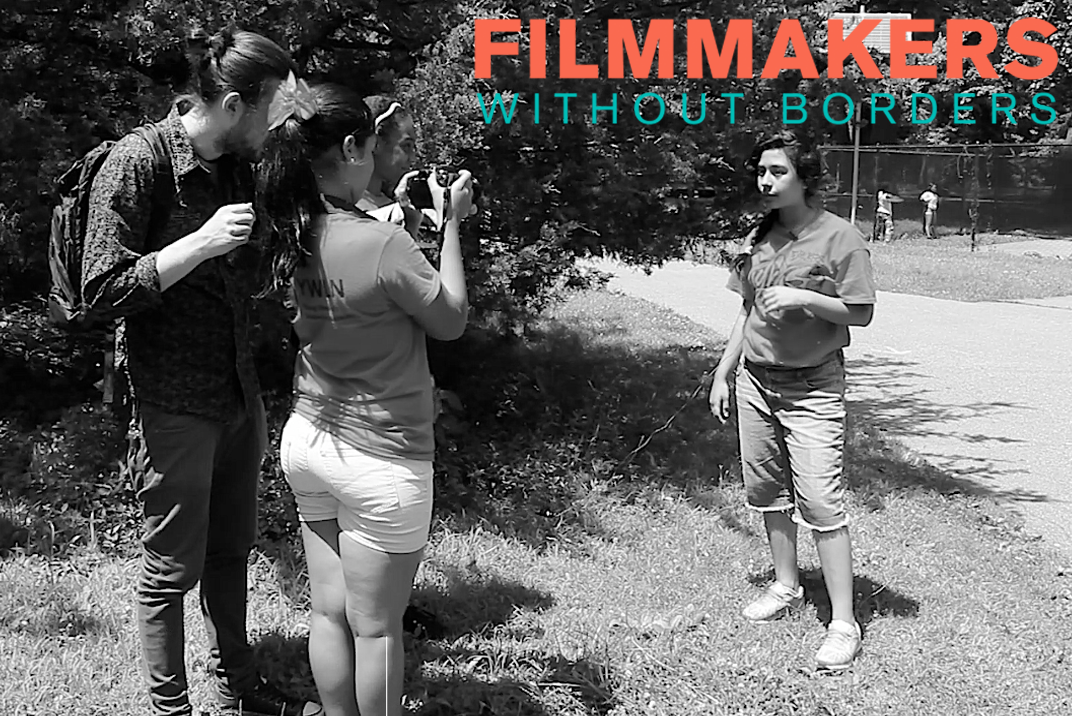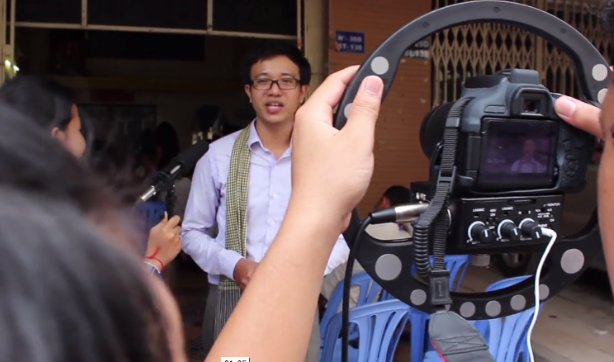Filmmakers Without Borders: A Group Of Young Adults Changing The Lives Of Youth Through Storytelling
Requests: 0
Views: 3
One group of passionate filmmakers have realized that it only takes a dream and a camera lense to help inspire the lives of young people around the world.
This group of people make up the nonprofit, Filmmakers Without Borders. They make it easy to understand how using your passion can change lives.
Headquartered in New York City, the team is comprised of educators, filmmakers, and technologists who travel around the world to change thousands of young lives in underserved communities through teaching the art of filmmaking.
They told RIZZARR they believe that teaching the filmmaking process can help many young people realize the potential they have to globally change the world through storytelling. We sat down with them for an interview on Filmmakers Without Borders and how it is motivating students across the world.
 (Photo: Fillmmakers Without Borders)
(Photo: Fillmmakers Without Borders)
 Student in Nepal learning fillmmaking. (Photo: Filmmakers Without Borders)
Student in Nepal learning fillmmaking. (Photo: Filmmakers Without Borders)
 Filmmakers Without Borders helping students in Nepal. (Photo: Fillmmakers Without Borders)
Filmmakers Without Borders helping students in Nepal. (Photo: Fillmmakers Without Borders)
RIZZARR INTERVIEW WITH FILMMMAKERS WITHOUT BORDERS
1. Who created Filmmakers Without Borders and what prompted its creation?
Filmmakers Without Borders was created by Corey Boling, a filmmaker and educator who has worked considerably with such non-profit organizations as the Tribeca Film Institute, The Educational Video Center, and the Museum of the Moving Image. He has an MA from Columbia University and an MSc from the University of Oxford. Working closely with the public school students in New York City, Corey was inspired to connect and lead a group of film educators who were interested in bringing the same filmmaking skills their were teaching in the United States to the developing world. The question he asked was, “In the ever changing technological landscape, where visual language and literacy are at the forefront of educational reform, why ignore those children from developing nations that may not have access to such innovations?” Filmmakers Without Borders would ultimately provide children from some of the most remote places on earth, through the art of filmmaking, an opportunity to learn the skills and craft of visual communication. (Photo: Fillmmakers Without Borders)
(Photo: Fillmmakers Without Borders)
2. What are some of the core elements or aspects of Filmmakers Without Borders?
It's really broad overview. (1) We identify experienced professional filmmakers who are eager to share their skills with the next generation of digital storytellers. (2)From video tutorials to customized curriculum, we work hard to provide a wide range of professional development and teacher training opportunities. (3) We equip participating filmmakers with digital cameras and emerging mobile technologies in order to teach with the most exciting equipment available. (4) We send filmmakers abroad to schools and other community organizations where they spend one-year teaching filmmaking, technology, & media literacy. (5) Participating filmmakers use video-conferencing and other communication tools to connect their overseas classrooms with schools back in the US. (6) We provide the technical and logistical support necessary to create films overseas and after returning to the US. From post-production to distribution.3. How many countries have you sent filmmakers to and what has been the impact?
Filmmakers Without Borders works closely with overseas schools and community organizations to ensure that participants are able to share their skills with the students who need it most. Whether it is a bilingual school in rural Honduras or an orphanage in India, our partner organizations form the backbone of participants’ time in the classroom and truly anchor their year abroad. Currently, Filmmakers Without Borders are working with students in Bangladesh, Bhutan, Cambodia, Honduras, India, Kenya, and Nepal. We've also added a couple more sites that aren’t on the website quite yet, notably Tanzania and Thailand. Our participants empower underserved youth to create their own short films and media projects. By providing underserved students with targeted technology, training, and methodology, Filmmakers Without Borders enables young people from across Asia, Latin America, Africa, and Oceania to explore their role within their respective community, culture, and society. The impact has been amazing! People can check out the videos on our Vimeo page as well as check out some of our partners and current fellows.VIDEO ON FILMMAKERS WITHOUT BORDERS
FWB in Nepal // New Teaching Techniques from FILMMAKERS without BORDERS on Vimeo.4. Why did you decide to get involved with Filmmakers Without Borders?
I decided to get involved with Filmmakers Without Borders because I believed in Corey’s mission to bring the art and science of making movies to kids in a number of developing countries. Working for years as a film educator for the New York City Department of Education, I witnessed firsthand how absolutely engaging the filmmaking process is for all children, no matter their socioeconomic status and/or cultural background. Students respond very well to performance and digital media, and are exposed to films and television at an early age. Why not teach kids from some of the most remote places on earth how to harness the power to manipulate this art medium in order to visually communicate with the world? When approached to join the FWB team, I knew right away that this organization would tap into my interests as a film educator, a filmmaker, and as a social activist. I am excited to help nurture the new creative voices of filmmakers that would not have had this opportunity elsewhere. It’s time to hear from these young filmmakers as well!5. What are some of the challenges that you and your colleagues faced as you all have developed the organization? And how did you all overcome them?
Some of the major challenges that we have faced as an organization is finding the time, energy, and space to fully develop the infrastructure. Many of us who sit on the executive team work full time jobs as film educators / filmmakers, so finding the time for all of us to get together in order to streamline ideas and delegate responsibilities was a bit of a challenge. Luckily for us, Corey has been an incredible leader, always accommodating our schedules and harnessing our own specific strengths for the benefit of the program. We spent countless hours meeting in each other’s apartments in NYC planning and developing curricula, recruiting the best possible teaching artists, and fine- tuning our core foundations and principles. In the end, if it were not the incredible team that Corey has assembled, as well as his dedication to organization, we would not have existed after year one. Fortunately, we have! And we are now stronger and more excited than ever, as we have now launched our first team of teaching artists around the world.6. What have been some of the most significant and gratifying milestones of Filmmakers Without Borders?
As a film educator at Frank Sinatra School of the Arts, one of the most regarded arts high schools in New York City, a special moment that I will never forget was the time when some of my graduating seniors asked to be interns for Filmmakers Without Borders. The students themselves found out about the organization through word of mouth as well as on social media, and they had no idea I was at all affiliated. Apparently word got out that I was affiliated with Corey and FWB, and my students took it upon themselves to inquire more about it. It isn’t that my students were interested that I consider being a milestone, but rather the fact that the word was spreading. As Director of Outreach, this meant a great deal to me, as I understood the importance of connecting with institutions around the world that could truly benefit from the work we were setting out to do. Student in Nepal learning fillmmaking. (Photo: Filmmakers Without Borders)
Student in Nepal learning fillmmaking. (Photo: Filmmakers Without Borders)
7. How has making Filmmakers Without Borders shaped your ideas about how youth and young adults can change the world?
I always tell my own students that films have the power of inspiring the greatest social revolutions on the planet. Films have been used as a means to entertain, educate, and criticize the status quo for over a century. Films are a wonderful creative medium to question and push the envelope. Allowing students from across the world, especially those from developing nations will foster a new sense of power and pride amongst children. The students that we will work with will now have the ability and the resources to visually represent themselves in a way that I am sure will be unique. They will now have the opportunity to share those stories with students from places like New York City, and collaborate in a manner that is oftentimes misunderstood. Our students from Bhutan will soon have the chance to screen their work in premier film festivals across the world, which will further inspire them to develop their craft as their audience expands. From my experience teaching film here in the South Bronx, Harlem, and Brooklyn, I truly understand the value of filmmaking as a means to empower all kids to believe in them and in what they stand for as human beings.8. What are you hoping that people will take away from Filmmakers Without Borders?
I truly hope that folks from the communities we are sending our teaching artists to completely embrace our efforts to foster a love for films and filmmaking as a whole community activity. I call it the “film bug”. I hope that all of the communities we work with; the children, parents, teachers, local politicians, everyone, falls in love with the process of making movies as a means to entertain and communicate with one another. I hope that our students are telling stories about their local communities in such a way that inspires everyone to support and endorse such creative practices. If we as an organization can do just that, inspire the community to want to share their stories through filmmaking, we have done our job. We are not just sending our teaching artists to make films about the communities. Instead, we are sending our participants to teach these communities how to make their own films through the new generation of life long filmmakers we hope to create. Filmmakers Without Borders helping students in Nepal. (Photo: Fillmmakers Without Borders)
Filmmakers Without Borders helping students in Nepal. (Photo: Fillmmakers Without Borders)
9. What advice would you give to anyone who trying to change/ improve the world?
My advice would be to first find what you love. In my case, and in the case with the wonderful folks that work FWB, I have found my love for filmmaking and for teaching. I have proven over and over again to myself that making films, and teaching young people how to make films is what I hope to do for the rest of my life. Now that I have self-actualized this, it’s time for me to help change the world, and bring film education to every single corner of the planet, to kids who would have never had the opportunity to become filmmakers.Reactions